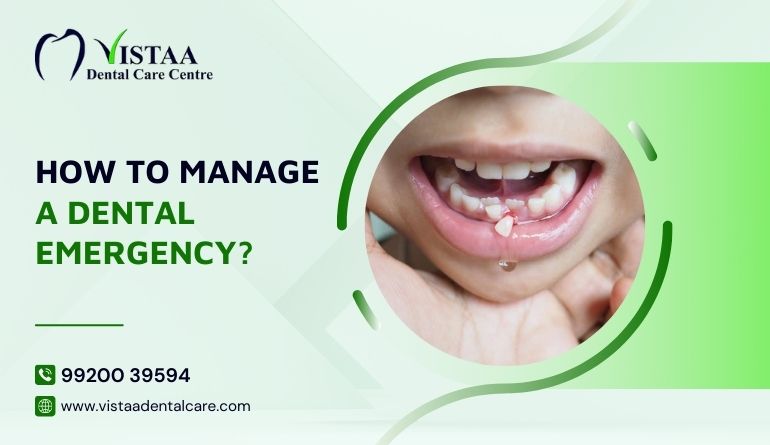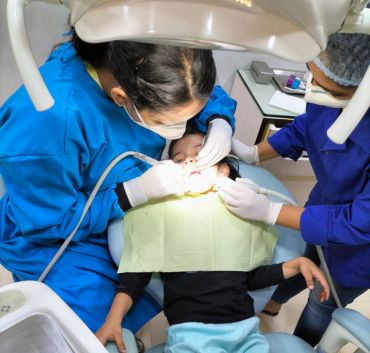How to Manage a Dental Emergency?
Dental emergencies can cause pain and anxiety and can occur at any time. Knowing how to react to an unexpected toothache or a knocked-out tooth might be crucial to maintaining your dental health. You can save your smile and avoid issues by taking prompt, efficient action. We'll go over frequent dental emergencies, what to do right away, and how to protect your teeth in the future in this guide.

Common Types of Dental Emergencies
Severe Toothache
An infection, cavity, or gum disease may be the cause of a chronic or painful toothache. It can get worse and cause more significant issues if treatment is not received.
What to do: To get rid of any debris, rinse your mouth with warm water and lightly floss. See your dentist right away and use an over-the-counter pain medication.
Chipped or Broken Tooth
A tooth may chip or crack due to mishaps or biting into hard foods, which could expose the nerve and cause discomfort.
What to do: To lessen swelling, rinse your mouth with warm water, gather any broken pieces, and apply a cold compress. Until you visit a dentist, refrain from chewing on the afflicted side.
Knocked-Out Tooth
Immediate action is necessary to improve the chances of salvaging a knocked-out tooth.
What to do: Rinse the tooth gently with water, try to replace it in its socket, and pick it up by the crown (don't touch the root). If that isn't feasible, immediately seek emergency dental treatment and store it in milk or a saline solution.
Lost Filling or Crown
The affected tooth may become more sensitive and susceptible to harm if a filling or crown is lost.
What to do: To avoid more issues, cover the area with tooth wax or temporary dental cement that may be purchased at pharmacies and see your dentist right once.
Bleeding Gums or Soft Tissue Injury
Large amounts of bleeding may result from cuts or wounds to the tongue, lips, or gums.
What to do: To stop the bleeding, rinse with warm salt water, gently massage with gauze, and contact a dentist if the bleeding doesn't cease after 15 minutes.
Abscess or Swelling
A dental abscess is a dangerous infection that develops around the gums or tooth root and is frequently accompanied by pain and swelling.
What to do: To stop the infection from spreading, rinse your mouth with warm salt water, avoid applying pressure to the swollen area, and seek dental care very away.
Immediate Steps to Take in a Dental Emergency
- Rinse your mouth with lukewarm water.
- Use cold compresses on the affected area to reduce swelling.
- Do not opt for over-the-counter pain relief methods as they can cause side effects.
- Preserve any broken tooth or dental restorations and carry them to the dentist carefully.
- Avoid self-treating any dental emergencies or using sharp objects on your teeth.
When to See a Dentist Immediately
If you experience any of the following symptoms, it might be high time to see a dentist:
- Severe or ongoing dental pain that doesn't go away with natural treatments.
- Excessive bleeding lasting longer than fifteen minutes.
- A tooth that has been knocked out or is seriously injured and needs immediate care.
- Fever or facial swelling could be signs of a serious infection.
- Difficulty chewing or opening your mouth because of an injury.
Preventing Dental Emergencies
While it may be difficult to prevent dental emergencies, it is still possible and is considered easier than treating a dental problem. This is how you can prevent dental emergencies to a great extent:
- Schedule regular visits with the dentist, who can detect any signs of potential dental problems before they turn into a threatening condition.
- Wear a mouthguard while you are playing sports to minimize chances of oral injuries such as broken teeth or fallen restorations.
- Avoid chewing on hard objects as they could damage the tooth. Steer clear from biting into ice, pens, or hard candies.
- Practice good oral hygiene such as daily brushing and flossing, which would prevent the formation of plaque and tartar and reduce the chances of toothache.
What to Keep in a Dental Emergency Kit
It is recommended to keep a dental emergency kit that you can carry around or would come in handy. Include items such as:
- Cotton swabs and sterile gauze.
- The dentist recommended pain relievers and an antiseptic mouthwash.
- A small container to carry knocked-out teeth or restorations.
- Your dentist’s contact information.
Dental emergencies can be overwhelming and often unavoidable, but being prepared for emergency situations and acting quickly can save your teeth and protect your oral health. Always seek professional dental care for emergencies to ensure the best outcomes. A little preparedness can go a long way in preserving your smile.
Looking for Emergency Dental Care in Goregaon? Book an appointment now!

Call Now